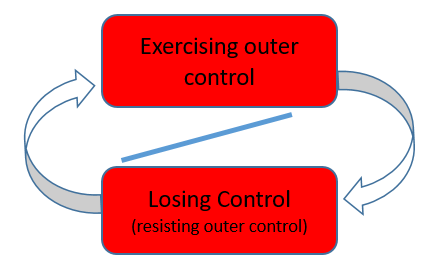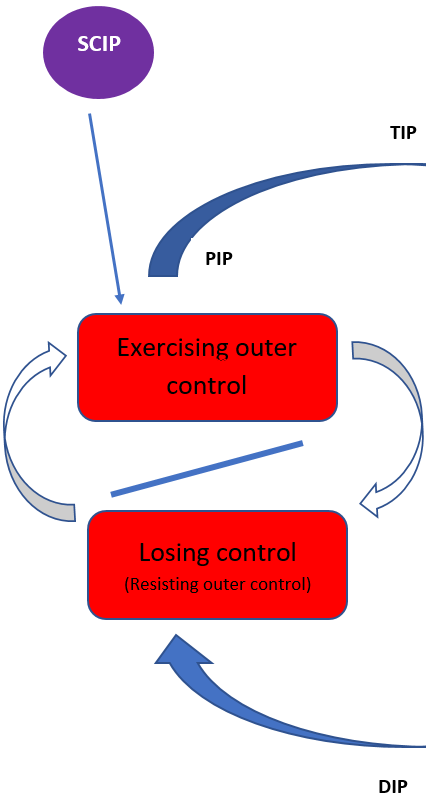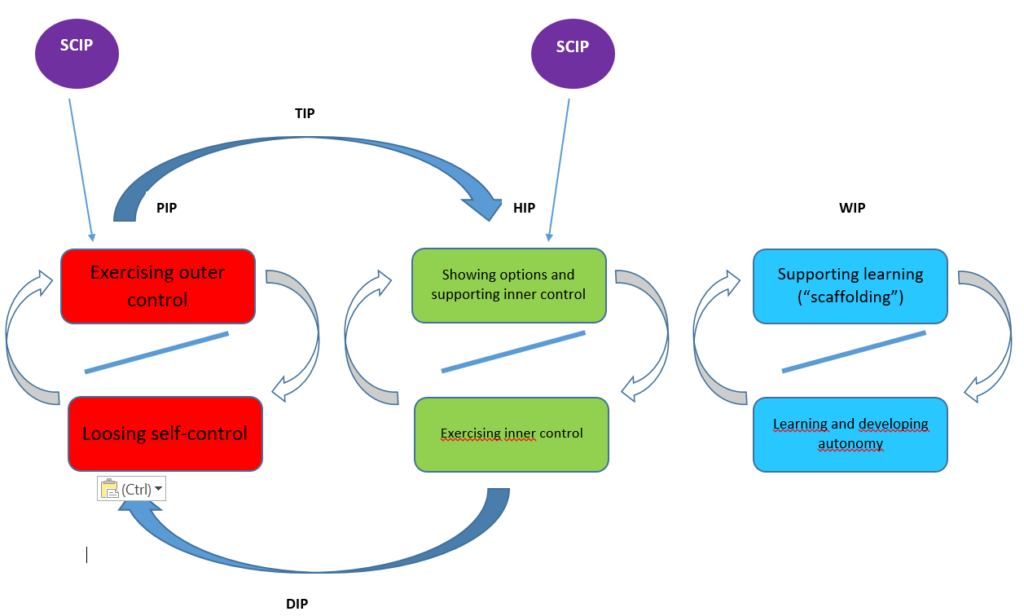The information available in this website is organized in “Reflectograms“: a way of organizing relevant contextual/relational information that may orient practitioners in their work with clients and their presenting concerns. Reflectograms comprise relational assessments guided by the IPscope framework (Tomm, 2014).
The IPscope is a heuristic instrument based on the concept of interpersonal patterns (IP), understood as recurrent interactions between two or more persons in which the coupling of two practices (behaviours, feelings, habits), or ideas (beliefs, values, cultural discourses) is mutually reinforcing, and can be distinguished by clients.
Imagine a father who perceives his child recurrently complaining and yelling whenever he says “no” to an expressed wish or want. In response, the father threatens to take away a privilege if he continues to scream which, in turn increases the child’s protest. The situation often escalates: more the father engages in “exercising outer control”, the more the child resists this approach, melts down or “loses control”.

Because this form of non-preferred way of relating may harm both relationships and individuals, we call them Pathologizing Interpersonal Pattern or PIP. As a possible “antidote” to this problematic, non-preferred form of interaction, imagine that the father decides to focus more on supporting the child’s developing ability to self-control by reminding them about the probable or usual natural consequences that may ensue from different options at hand. In time, “showing options and supporting self-control” may invite, as a recurrent response, that the child engages in “exercising inner control”.

A Healing Interpersonal Pattern or HIP is a preferred IP which may serve as an “antidote” to a PIP, which in the long run may bring forth a more enduring Wellness Interpersonal Patter or WIP such as “Supporting learning” coupled with “Learning and developing autonomy”.
Socio-Cultural Interpersonal Patterns (SCIPs) show powerful cultural ideas or discourses possibly supporting either PIPs, HIPs, or WIPs. For instance, believing that “Kids should always comply with their parents” may feed the inclination towards “Exercising outer control”. Likewise, believing that “children have a natural desire for autonomy” may influence a father in “showing options and supporting self-control”.

IPscope-informed therapists usually hope to help clients disengage from PIPs to foster HIPs and WIPS supported by the kinds of SCIPs that align better with their preferred ways of relating. Specifically, we use Transforming Interpersonal Patterns (TIPs) to facilitate therapeutic change, as a movement away from objectionable, and towards preferred ways of relating (i.e., from PIPs to HIPs).

Transforming interpersonal patterns (TIPs) can be seen as conversational practices generative of therapeutic change. Deconstructive TIPs are those in which therapy participants make conversationally evident objectionable practices/PIPs, for example, acceptably constructing a child’s protests as understandable reactions to her father’s impositions (imposing/protesting). Coming to mutually reject an idea that supports a non-preferred practice would be regarded as a deconstructive TIP as well. For example, participants may come to agree that believing in “children should always comply with what adults say” gets them stuck in the abovementioned PIP. Conversely, constructive TIPs make evident preferred practices (for example, parents may come to agree that their child tends to enact competence as a response to their parental encouragement); or ideas (e.g., “children naturally claim their own autonomy”).
Finally, a Deteriorating Interpersonal Pattern (DIP) depicts non-preferred movements from positive IPs (WIPs, HIPs, TIPs) toward negative forms of interaction (PIPs). Interactions between most relevant IPs to understand a particular situation can be mapped into REFLECTOGRAMS like this:

For a fuller history and description of the IPscope see Tomm, K. (2014). Introducing the IPscope: A systemic assessment tool for distinguishing interpersonal patterns. In K. Tomm, D. Wulff, S. Saint-George, & T. Strong (Eds.), Interpersonal Patterns: Inviting relational understandings for therapeutic change (pp. 13–35). New York, NY: Routledge
